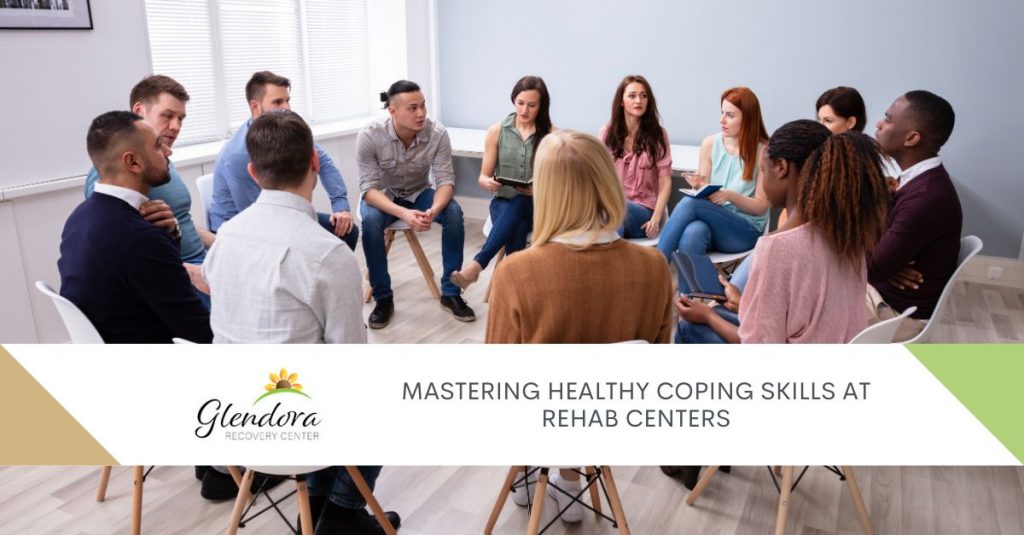For many, emotional chaos often marks the beginning of the road to recovery. In this context going into rehab is not only about overcoming addiction, it is a way to transition from a chaotic emotional state to one of tranquility and stability. A key part of this transition is played by rehab centers like Glendora Recovery Center, which help people navigate the turbulent seas of rehab and arrive at a more stable, peaceful state of mind.
Understanding Healthy Coping Mechanisms and Resilience
Creating healthy coping mechanisms is like developing a strong personal arsenal against the triggers of addiction. The goal is to provide healthy alternatives for drugs or alcohol use when dealing with stress, anxiety, or other strong feelings. People learn throughout recovery which coping mechanisms uplift their overall wellbeing and which ones lead them back into the cycle of addiction.
In the journey to healing, healthy coping mechanisms go hand in-hand with resilience. According to the American Psychological Association, resilience is the process and result of effectively adjusting to difficult or challenging situations in life, particularly through mental, emotional, and behavioral flexibility and adjustment to internal and external demands or the capacity to overcome adversity. Throughout therapy, resilience is emphasized as a vital element of sustained healing.
Healthy vs. Pathological Coping
Every one of us employs coping skills to manage stress, but not all coping techniques are beneficial. Rehab centers put more of an emphasis on teaching constructive and positive coping skills than pathological coping skills, which may reduce stress in the short term but do more harm over time.
Here’s an example of both a healthy and a pathological coping skill:
Healthy Coping Skill: Journaling
Journaling, which involves expressing thoughts and emotions in writing, is an effective, healthy coping mechanism. It offers a secure, private space where people can explore their emotions, think back on their experiences, and achieve emotional clarity. Individuals can track their progress, recognize stressors, and effectively process challenging feelings by keeping a journal on a regular basis. The practice improves emotional control, stress reduction, and self-awareness, all of which support general mental health and hardship resistance.
Pathological Coping Skill: Substance Abuse
Substance addiction is a pathological coping mechanism in which people use alcohol or drugs to dull or escape from their stress and emotions. Substance misuse offers a short-term, detrimental relief from discomfort rather than addressing the underlying cause of it. It can also increase mental health difficulties, lead to addiction, and create a vicious cycle of dependence. This unhealthy way of coping worsens the underlying issues rather than resolving them, which worsens both mental and physical health.
Understanding Emotional Turbulence
A person may experience emotional distress in recovery from a number of factors, such as guilt, traumatic experiences in the past, or the stress of adjusting to a life without drugs. Recognizing these triggers, rehab centers adjust their strategies accordingly.
Effective rehab centers don’t just acknowledge these emotional obstacles, they actively seek to provide individuals with the skills they need to face and overcome them. With a priority on providing a secure environment, Glendora Recovery Center helps people explore their emotions, comprehend their origins, and learn healthier methods to deal with them.
Addressing Emotional Challenges
At Glendora Recovery Center, we understand the importance of fully understanding the emotional landscape of each individual. We can better support our clients through their recovery path if we address the underlying reasons of emotional distress.
Techniques for Emotional Management
To address emotional turmoil, Glendora Recovery Center implements a variety of techniques:
- Cognitive Behavioral Therapy (CBT): CBT assists people in recognizing and challenging harmful thought patterns and replacing them with healthier, realistic ones.
- Mindfulness and Meditation: By promoting a sense of calm and presence, mindfulness and meditation help people experience their emotions without being overwhelmed by them.
- Art and Music Therapy: Complicated emotions may be processed and expressed in a non-verbal way through creative forms of therapy such as music and art.
- Group Therapy: Sharing experiences with others who understand the journey of recovery can provide comfort and insight, reducing feelings of isolation.
Each of these strategies represents a step toward emotional mastery. They are more than just coping strategies; they lead to a deeper awareness of oneself and a solid foundation for long-term recovery. The integration of various therapies at Glendora is suited to each individual’s specific emotional needs.
Building a Toolkit for Life and Applying Skills Beyond Rehab
The skills developed in rehab are not just useful during the course of treatment; they are also useful in everyday life. At Glendora we focus on providing our clients with the skills they need to overcome the emotional problems that will arise post-recovery.
Maintaining Emotional Balance
Rehab centers teach a variety of practices that are essential for maintaining emotional balance and preventing relapse in the outside world. These include stress management techniques and good communication skills.
We understand that it can be challenging to adjust from rehab to everyday life. For this reason, the skills acquired at Glendora are meant to be long-lasting and useful. They are not just to be used within the walls of the rehab center but are meant to be lifelong companions, aiding individuals in navigating the complexities of life post-recovery.
A Foundation for Emotional Strength
At Glendora Recovery Center, our mission extends beyond addiction therapy and being a rehab center. We hope to guide each person to a place of emotional strength and stability, building the groundwork for a life of sobriety and wellness. Please don’t hesitate to contact us if you need assistance on your path to recovery or if you have any questions about our programs.



